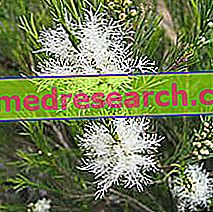
Scientific name
Melaleuca alternifolia
Family
Myrtaceae
Origin
Australia
Synonyms
Tea tree oil
Used Parts
Drug consisting of leaves
Chemical constituents
- Essential oil: terpinen-4-ol, an alcohol that makes up about 40% of the oil, in addition to monoterpenes (gammaterpinene, alfaterpinene) and eucalyptol (3-4%).
Melaleuca in Herbalist: Properties of Tea Tree Oil
Melaleuca oil is commonly considered the remedy for all bacterial or fungal infections, well tolerated by skin and mucous membranes. Its essential oil, if used pure, can however irritate skin and mucous membranes, and it is certainly not the best in terms of tolerability, as it is presented on the market. Experimentally, the essential oil of melaleuca has also demonstrated an interesting anti-inflammatory activity.
Biological activity
Melaleuca oil has strong antibacterial properties, which have been confirmed by various studies conducted on the subject.
This antimicrobial action appears to be carried out by the aforementioned oil through the denaturation of the proteins of the bacterial cell membrane, with consequent destruction of the membrane itself and death of the bacteria.
Melaleuca oil has also been shown to have antifungal activity; in particular it has proved effective in counteracting infections caused by dermatophytes and yeasts, such as, for example, Malassezia furfur, Microsporum canis and Candida albicans .
Finally, it seems that melaleuca oil is also effective against lice infestations.
However, despite the results obtained from the studies conducted so far, the use of melaleuca has not obtained official approval for any type of therapeutic indication.
Melaleuca in folk medicine and homeopathy
In folk medicine, melaleuca is used as an internal remedy for the treatment of pharyngitis, tonsillitis, sinusitis and colitis.
Externally, however, traditional medicine uses this plant as a remedy to counteract skin infections, onychomycosis, gingivitis, ulcers of the oral mucosa, burns and insect bites.
As far as homeopathic medicine is concerned, on the other hand, at the moment the melaleuca does not find significant uses in this area.
Tea Tree - Side Effects
Following use, possible skin irritations and allergic reactions, even large ones
Contraindications
Avoid using melaleuca in case of established hypersensitivity to one or more components and in patients with eczematous type skin diseases.
Moreover, it is good to remember that the internal intake of melaleuca or its oil is absolutely contraindicated because of its toxicity.
Pharmacological Interactions
- not known



